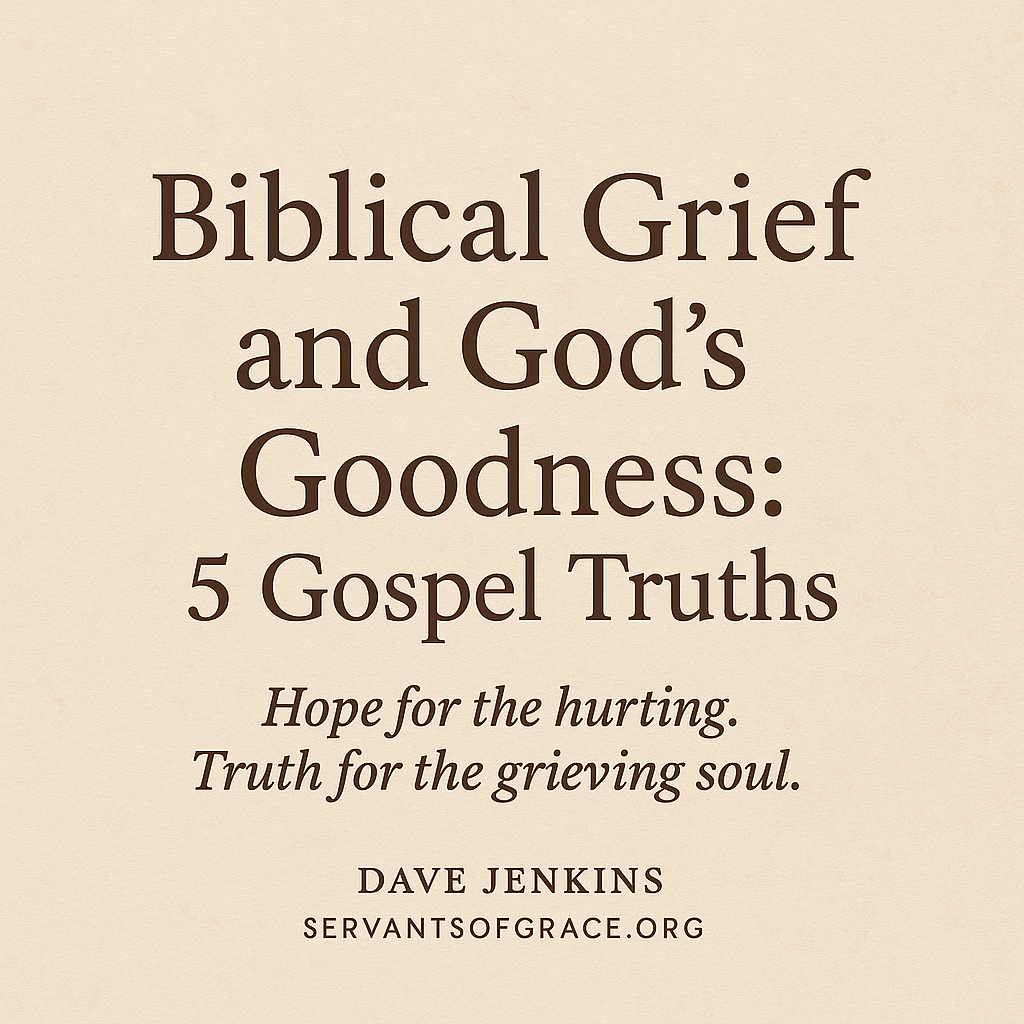⏱️ Estimated Reading Time: 7 min read
Grief is a universal experience in a post-fall world (Romans 5:12). Since October 2021, I’ve personally walked through deep valleys of loss—my beloved mentor in ministry, my father to dementia in January 2025, and most recently, my older brother in March 2025. Each loss has left its mark, and each one has been a reminder that we are fragile. Yet, through it all, I have found that the Lord is steadfast. His presence has been near, His Word unwavering, and His goodness constant.
Grief is real—but so is the gospel.
As Christians, we don’t grieve as those without hope. We grieve, yes, but we grieve with the firm assurance that God is with us. The unchanging character of God and His promises in Christ anchor our hearts, even in the deepest sorrow (1 Thessalonians 4:13). What follows is not just a list of theological truths—it’s an invitation to walk with those who, like me, have experienced profound loss. My prayer is that as you read, you will find comfort, hope, and strength from the Word of God and the Holy Spirit, our Comforter.
1. God Is Good Even in Grief
It’s easy to question God’s goodness in the midst of suffering. The weight of grief can obscure the truth that God is good. But Scripture reminds us that The Lord is good—not just in our happy moments, but especially in our sorrow (Psalm 34:8).
“Oh, taste and see that the Lord is good! Blessed is the man who takes refuge in Him.” – Psalm 34:8
I’ve had to return to this truth over and over in my own grief with the loss of my brother, my father, and my mentor. God’s goodness doesn’t change with our circumstances. In the darkest moments, His goodness remains steadfast. Even when I can’t feel it, I trust in it, knowing that God is not just sovereign; He is kind. He sees my sorrow and promises to meet me there (2 Corinthians 1:3-4).
2. The Lord Draws Near to the Brokenhearted
Grief often isolates us. In those moments, we may feel alone, as though no one truly understands our pain. But God promises that He draws near to the brokenhearted (Psalm 34:18). This is not a vague promise—it is a reality grounded in the character of God. He is not distant or indifferent. He is with us in our suffering because He is with us always and knows the true estate of our hearts. He is near. He meets us in our brokenness.
“The Lord is near to the brokenhearted and saves the crushed in spirit.” – Psalm 34:18
In my own times of grief, I’ve often felt the nearness of God in ways I can’t explain, but I know it’s real. He is near. He meets us in our brokenness. His presence, not our strength, carries us through. This is the beauty of God’s faithfulness (Psalm 46:1).
3. Christ Knows Sorrow and Carries Us Through
Jesus was a man of sorrows and acquainted with grief (Isaiah 53:3). He didn’t just observe suffering from a distance—He entered into it. He understands our pain intimately. He knows what it means to be crushed (Isaiah 53:5), betrayed (Luke 22:48), and weep (John 11:35). Christ’s suffering is not abstract; it’s personal. And in our sorrow, He is there, walking alongside us, carrying our burdens.
Because Christ bore our griefs and carried our sorrows (Isaiah 53:4), we can cast our burdens on Him (Psalm 55:22; 1 Peter 5:7), knowing that He understands and sustains His people through every season and stage of life (Matthew 11:28-30). In Christ, we have a Savior who is not only with us but who has gone before us in suffering.
4. Historical Testimonies of Faith Through Sorrow
Church history is rich with examples of saints who endured suffering with eyes fixed on Christ. From Polycarp to Spurgeon, from Elisabeth Elliot to Corrie ten Boom, Samuel Rutherford, and Susannah Spurgeon, believers have suffered—and testified to the goodness of God (Romans 8:18).
- Corrie ten Boom, having survived the horrors of a Nazi concentration camp, spoke often of forgiveness and the sufficiency of God’s grace:
“You can never learn that Christ is all you need, until Christ is all you have.” – *The Hiding Place* (1971)
- Samuel Rutherford, imprisoned for preaching the gospel, wrote pastoral letters full of Christ-exalting comfort:
“I am in Christ’s school; let Him do as He will with me. If He saw it good for me, He might throw me into the fire. The Lord’s will be done.” – *Letters of Samuel Rutherford* (1664)
- Susannah Spurgeon, though plagued by chronic illness, remained steadfast in her faith and ministry support. She wrote:
“I know what it is to be lonely in the service of the Lord; but I do not forget that He has promised to be my Shepherd, and to lead me to the still waters.” – *The Life and Writings of Susannah Spurgeon* (1893)
Each one, in their own suffering, bore witness to the sustaining power of Christ in their season of suffering (2 Corinthians 1:5). Their lives remind us that God’s faithfulness extends through all generations.
5. Practical Helps for Walking Through Grief
Grief is not linear, and it does not operate on a timetable. But there are wise, biblical ways to walk through it. These practices are not quick fixes, but means of grace to help reorient your heart to the Lord. Here are practical steps anyone, regardless of their role, can apply:
- Stay rooted in Scripture – Even if you only read a verse a day, the Bible is full of comforting truths to help you through your grief (Psalm 119:105).
- Surround yourself with godly friends – Seek out people who will weep with you and remind you of God’s promises (Romans 12:15).
- Pray honestly – Don’t hide your pain from God. He sees, knows, and is with you everywhere you go, even in your grief. Lament is a biblical form of worship that is given by God to help us pour our hearts out to the Lord who truly cares for and longs to minister the balm of His grace to the hurting with the comfort of His promises (Psalm 13:1-2).
- Journal or write out prayers – Writing can be a powerful way to process your thoughts and emotions with God’s Word (Habakkuk 3:17-19).
- If you are that friend, biblical counselor, or pastor – Please listen first, ask lots of questions, then pray for the person, and continue to walk with them, praying, encouraging, and offering God’s comfort from His Word to them (Proverbs 15:22).
These simple but powerful tools help us keep our focus on the hope that is ours in Christ (Romans 8:28).
Reflection and Encouragement for the Weary
Dear Christian, if you are grieving today, know this: you are not alone. The God who sees, knows, and loves you is with you (Psalm 56:8). Grief may be part of your story, but it is not the end of your story. The risen Christ is your hope today and always (1 Peter 1:3).
“Weeping may tarry for the night, but joy comes with the morning.” – Psalm 30:5
A Word for Pastors and Ministry Leaders
If you are a pastor or ministry leader, do not underestimate the power of your being there for the hurting and grieving. The people the Lord has entrusted you to shepherd don’t need you to have all the answers, they need you to point them to Christ (2 Corinthians 1:4). Preach the hope of the gospel. Visit the grieving. Cry with them. Pray with them. Lead with truth and tenderness (Romans 12:15).
Offer resources like *The Valley of Vision* or the Psalms. Encourage them to read biographies of saints who suffered well. Equip them not just to endure, but to trust in the Lord in every season and stage of life (2 Corinthians 1:5).
Final Encouragement
Dear Christian, the road of grief is long and winding, but you never walk it alone. The God of all comfort walks beside you (2 Corinthians 1:3), and His grace is sufficient for every tear (2 Corinthians 12:9).
Dear Christian, please know this truth: the One who knows you fully also loves you perfectly—and His grip on you is secure (John 10:28).
Dave Jenkins is happily married to his wife, Sarah. He is a writer, editor, and speaker living in beautiful Southern Oregon. Dave is a lover of Christ, His people, the Church, and sound theology. He serves as the Executive Director of Servants of Grace Ministries, the Executive Editor of Theology for Life Magazine, the Host and Producer of Equipping You in Grace Podcast, and is a contributor to and producer of Contending for the Word. He is the author of The Word Explored: The Problem of Biblical Illiteracy and What To Do About It (House to House, 2021), The Word Matters: Defending Biblical Authority Against the Spirit of the Age (G3 Press, 2022), and Contentment: The Journey of a Lifetime (Theology for Life, 2024). You can find him on Facebook, Twitter, Instagram, Youtube, or read his newsletter. Dave loves to spend time with his wife, going to movies, eating at a nice restaurant, or going out for a round of golf with a good friend. He is also a voracious reader, in particular of Reformed theology, and the Puritans. You will often find him when he’s not busy with ministry reading a pile of the latest books from a wide variety of Christian publishers. Dave received his M.A.R. and M.Div through Liberty Baptist Theological Seminary.




